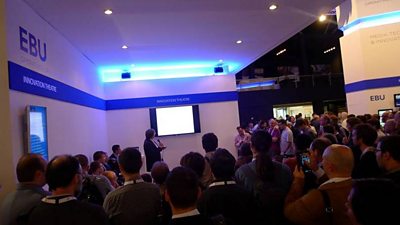It has been a little more than a month since our last week-notes. Lots have happened since.
We've heard the sad news that BERG, who were in great part our inspiration for weeknotes, are . But there has been good news, too: the publication of the Cross-Platform Authentication technology, and a very successful presence at the yearly IBC event.

COMMA and CPA at IBC
A number of us went to to represent, among other things, the COMMA project and our work on Cross-Platform Authentication.
James reports that feedback on comma/kiwi was very positive, universally. We essentially had a non-stop stream of people to the stand asking for a demo on every day - even Tuesday, when it’s typically quiet.
Meanwhile, Sean and Chris Needham presented the Cross Platform Authentication work (for which, coincidentally, was just published) on the EBU stand, together with Michael and Valentin of the EBU.
±«Óătv Stories / Mythology Engine / The Archers
Tristan continued his tour of drama interactive and production teams with a visit to the interactive team in Cardiff, who look after Doctor Who, Sherlock and Wizards vs Aliens, amongst other things, as well as talks with the editor of the Archers. The visits were an opportunity to present our past work on the Mythology Engine, and the upcoming work on what we have code-named “±«Óătv Stories”. They were also a chance to learn a trove of little (and big) things.
Tristan lists some of them:
- Programmes can change right up to transmission time with edits happening at the very last minute.
- Doctor Who fans have created transcribed scripts for every episode, we don’t have the originals.
- At the beginning of WW2 the government culled cattle as there weren’t enough men to farm them, unfortunately the war went on longer than expected and the lack of cattle also caused a lack of fertiliser, leading to national rationing. The Archers was originally conceived soon after the war, with help from the Ministry of Agriculture, Fisheries and Food, as a means of educating farmers on ways to increase productivity.
Recommendations
Chris Newell has implemented and evaluated an Adaptive KNN recommender. This automatically picks the best recommender algorithm for each user and programme based on how much viewing history data is available. Collaborative filtering algorithms require this data whereas attribute-based algorithms only require programme attributes. The benefits of the Adaptive KNN approach are improved prediction accuracy and an earlier presence of new programmes in the recommendations.
Telescopic Text and expanding News
While listening to a session on audience research around younger news audiences, Tristan played with to make .
Tristan explain: “The research said that some younger people can find the news hard to get into because they don’t understand the history or concepts behind the stories - maybe they haven’t lived through that history or they just have less general knowledge and education. This aims to let you explore the topics in an article. It was based on a single news article, with a couple of other sources to help explain things, and then I hacked at them to fit them into the Telescopic Text format.”
This technique of expanding, annotated text reminded me of the “Genius” platform (of fame), which has now expanded to cover or even history and .
The Craft
A lot of the messages I received this week weren’t so much about particular projects, but about our craft in general: research, prototyping, interviews, hacking, and so on.
First, Tristan shared .
This started an interesting discussion. Chris Newell agreed with the article when it comes to finding bugs or problems in interfaces, but if you’re wanting to know if people prefer interface A over interface B then sample size and composition is significant. And Jiri said… “Statistically valid sample of participants might be required for some sort of performance marketing or multi-variant testing, for example fine-tuning existing interface or iterating on a call to action. Also, if there is a real need to get statistically valid data it would be better to sample according to psychographic profiles rather than using demographics.”
Meanwhile, Libby thinking a lot about prototyping generally, and also what strategy we ought to take for MediaScape, and , with lots of help from AndrewN.
Also from Libby, this excellent Houde and Hill .
Joanne, Tim and Jiri also attended a two-day depth interviewing training course organized by the ±«Óătv Academy. The training focused on preparing, managing and conducting depth interviews as part of qualitative research for design. The course taught us a range of techniques from active listening to probing and prompting…
Links
This week’s links courtesy of Thomas, Tristan, and Jiri:
- , a data pipeline manager in Node.js Â
- - producing documentaries that expect you to look up the bits you don’t know, rather than explaining everything:
- - Open Marketplace for Algorithms:
- And finally…